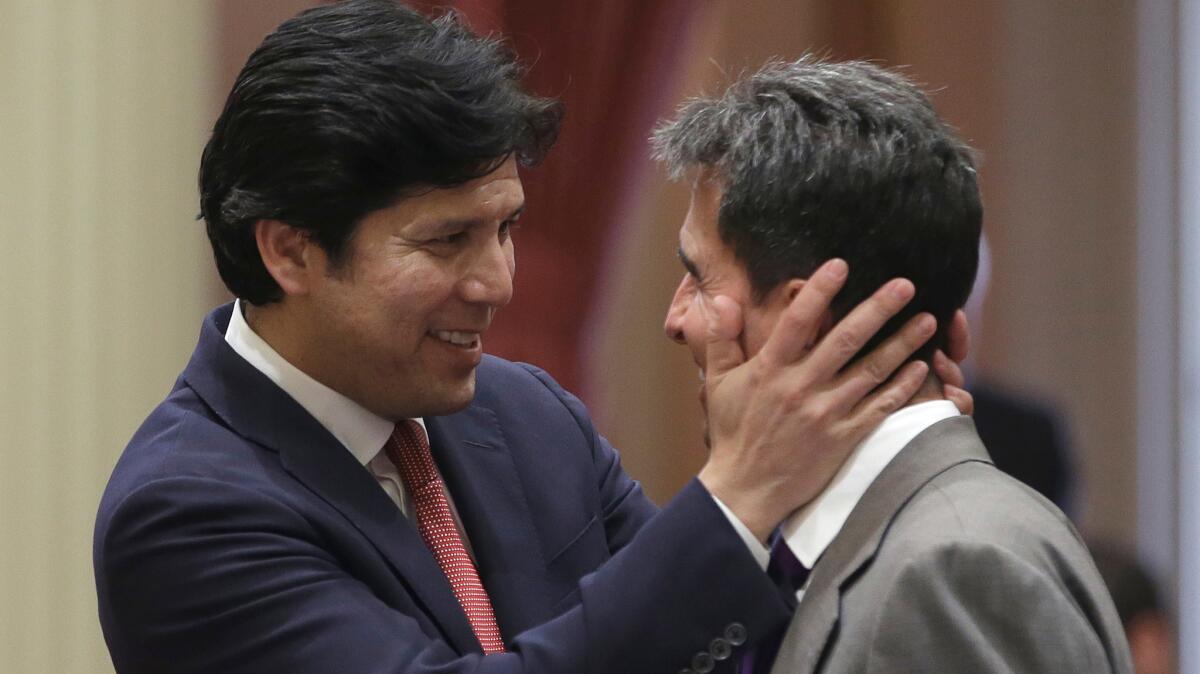California Legislature approves $171 billion state budget

- Share via
Reporting from Sacramento — With concerns about the potential for another recession casting a shadow over this year’s budget negotiations, California lawmakers approved a new $170.9-billion spending plan on Wednesday that increases some funding for social services but stashes more away in a rainy-day fund.
Although lawmakers are finishing their work on this year’s budget, some of the most consequential decisions for the state’s financial future may not be made until the November election. Voters will likely be asked whether to extend higher taxes on the wealthy, increase the levy on cigarettes or borrow billions of dollars to build and renovate schools.
It’s a classic example of California’s dual-track system for managing its finances, with some decisions made in the Capitol and others at the ballot box.
“It’s ultimately up to the people of California to make their own decision,” said Senate leader Kevin de León (D-Los Angeles).
The budget passed swiftly Wednesday on a nearly party-line vote. State Sen. Anthony Cannella of Ceres in Stanislaus County was the only Republican to vote in favor of the plan.
This year’s budget negotiations followed a similar pattern as the last few annual debates over spending in the Capitol, with Gov. Jerry Brown trying to tamp down calls for more spending while Democratic lawmakers sought new funding for government services.
But Brown issued increasingly stark warnings about the possibility of another economic downturn, and he slashed his projections when releasing his budget proposal last month.
Although California has enjoyed years of financial progress as the economy improved, “the surging tide of revenue is beginning to turn,” Brown said in May.
The governor successfully convinced lawmakers to stash an extra $2 billion into the rainy-day fund, bringing the total to an estimated $6.7 billion by next summer. The budget includes another $1.75-billion cushion in case revenue runs lower or spending is higher than expected.
Brown, lawmakers strike budget deal that includes more money for housing, child care »
The reserves help ensure “that no matter what happens, we’ll be in a good place,” said Assembly Speaker Anthony Rendon (D-Lakewood).
In turn, Brown agreed to increase spending on child care and allow families to receive additional welfare benefits.
“We pushed hard to make sure we make investments in the most vulnerable communities in California,” de León said before the Legislature voted on the bills on Wednesday.
Brown tweeted his approval Wednesday evening: “Good work from the state legislature: we’re building reserves and investing in CA.”
The budget ramps up payments to state-subsidized child care providers to help them keep pace with California’s higher minimum wage, which is slated to hit $15 by 2022.
The spending plan also ends a policy known as the “maximum family grant,” which prevented families from receiving extra welfare assistance if they had a new child while already receiving benefits.
“It has only driven women and their children into deeper poverty,” said Sen. Holly Mitchell (D-Los Angeles), who fought to end the policy.
Removing the restriction would help an estimated 130,000 children in 95,000 families with an extra $136 per child, per month.
Republicans were critical of new spending on government programs, echoing Brown’s concerns about the possibility of another recession.
“It doesn’t take more than basic arithmetic to show that level of increase is unsustainable,” said Assemblyman Jay Obernolte (R-Big Bear Lake), the vice chairman of the Assembly budget committee.
While lawmakers were working on this year’s budget, advocates have been circulating petitions to place tax-hike measures on the ballot in November.
One measure, supported by the California Teachers Assn., would extend higher taxes on the wealthy, producing an estimated $5 billion to $11 billion per year. The money would go to public schools, community colleges and government health programs.
The taxes were originally raised by a ballot initiative Brown championed in 2012, which was supposed to be temporary.
Another measure would increase the tax on cigarettes by $2 per pack, raising an estimated $1.1 billion to $1.6 billion in revenue annually. It’s supported by labor unions and Tom Steyer, a deep-pocketed Democratic donor and environmentalist, and it’s intended to boost funding for health care and anti-smoking efforts.
A third budget-related measure already has qualified for the ballot: a proposal to authorize $9 billion in bonds to build and renovate schools and community colleges. The state would incur an estimated $8.6 billion in interest costs over 35 years, and annual payments were estimated at $500 million.
Times staff writers Christine Mai-Duc and John Myers contributed to this report.
Twitter: @chrismegerian
ALSO:
California Legislature swiftly debates and passes budget
Democrats think this might be the year that Gov. Jerry Brown loosens his grip on state spending
Brown’s budget dominance starts with firm grip on revenue forecasts
UPDATES:
5:23 p.m.: This article was updated to include details on the vote and a quote from the governor.
This article was originally published at 5:11 p.m.
More to Read
Get the L.A. Times Politics newsletter
Deeply reported insights into legislation, politics and policy from Sacramento, Washington and beyond. In your inbox twice per week.
You may occasionally receive promotional content from the Los Angeles Times.











